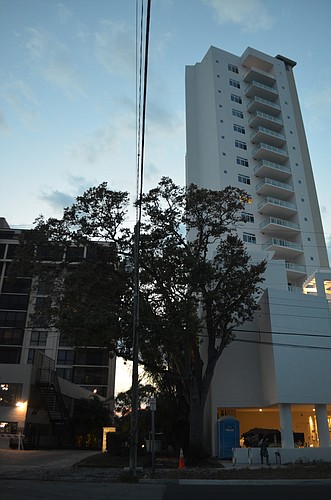- July 9, 2025
-
-
Loading

Loading

City Attorney Robert Fournier has sided with residents who have disputed staffers’ interpretation of the city’s zoning regulations, stating his belief the city is required to provide notice to residents and collect fees regarding certain downtown development proposals — standards that have previously not been applied.
On Aug. 1, Fournier sent a letter to Dan Lobeck, the attorney representing the resident activist group STOP. In June, STOP threatened legal action if the city did not adjust its policies for noticing and charging fees for certain development applications.
Specifically, STOP objected to the city’s policy for managing site plan applications when a developer files a building permit application at the same time. When a developer files a site plan ahead of a building permit application, the city sends notices to residents living within 500 feet of the property in question. When the two applications were filed concurrently, however, the city did not send out notice or collect site plan review fees.
STOP argued the city’s policy made it too difficult for residents to track new developments downtown, where staff is empowered to administratively approve projects that comply with established zoning regulations. In a statement in June, city staff affirmed its belief that it was charging appropriate fees for the development applications it received.
Fournier’s letter, however, reaches the same conclusions STOP did. Fournier said he did not believe the zoning code made a distinction about the standards for providing notice or charging fees if a developer filed for a building permit at the same time.
“This requirement should apply whether the applicant opts to have the site plan application processed ‘in advance of a building permit’ or processed ‘in conjunction with a building permit,’” Fournier wrote.
Kate Lowman, a member of STOP’s steering committee, said the city attorney’s letter was vindication of the group’s approach to the subject.
“We’re happy to see that,” Lowman said. “We were pretty confident of our understanding of the code, or we wouldn’t have taken the steps we did, but it’s still nice to see it confirmed.”
Lowman said STOP believes it’s crucial for staff to review all site plans with the same scrutiny, because it’s an opportunity to give developers feedback about the general layout and scope of a project. And the group believes it’s essential for staff to provide notice of all site plans, because downtown residents have limited windows to comment on — or object to — individual projects.
“They can’t appeal, because they don’t know when projects are approved,” Lowman said.
Fournier said this topic is scheduled for discussion at the Aug. 20 commission meeting. Fournier noted he was offering his analysis in an advisory role.
“Consequently, while I am prepared to recommend that the zoning code be administered in accordance with my opinion as above stated, my opinion is not binding on staff with respect to this matter,” Fournier wrote.
Lowman said STOP would be in attendance at the Aug. 20 meeting and hoped staff would adopt Fournier’s recommendations.
Even if the city changes its policies, Lowman said staff would still be in a challenging position when it comes to evaluating site plans filed concurrently with building permit applications.
On one hand, Lowman hoped staff would advocate for the community’s best interests regardless of the situation. But she also recognized that developers have produced expensive, detailed plans by the time they file for a building permit, and that any proposed changes to a project at that point would be costly.
For now, STOP is focused on getting staff to provide notice and collect fees for all site plans. In the near future, however, Lowman suggested city officials should further examine the dynamics in play when a developer files a site plan and building permit application at the same time.
“(Staff is) in a very difficult place where they’re responsible for two things: making sure the site plan is right, and respecting a builder’s time, effort and money,” Lowman said. “How do you really reconcile those two things? I think ultimately, that’s a question that ought to be addressed.”